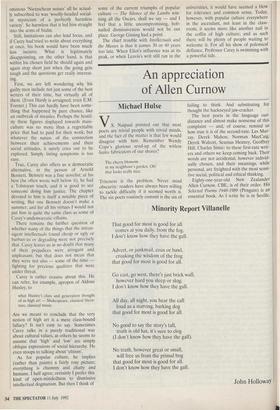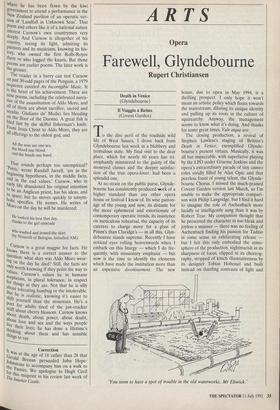An appreciation of Allen Curnow
Michael Hulse
V.S. Naipaul pointed out that most poets are trivial people with trivial minds, and the fact of the matter is that few would disagree with him. Remember Wendy Cope's glorious send-up of the witless haiku fabricators of our shores?
The cherry blossom in my neighbour's garden. Oh! that looks really nice.
Triteness is the problem. Never mind obscurity: readers have always been willing to tackle difficulty if it seemed worth it. The sin poets routinely commit is the sin of failing to think. And substituting for thought the hackneyed jaw-cracker.
The best poets in the language out- distance and almost make nonsense of this complaint — and, of course, remind us how true it is of the second-rate. Les Mur- ray, Derek Mahon, Norman MacCaig, Derek Walcott, Seamus Heaney, Geoffrey Hill, Charles Simic: to these first-rate writ- ers and others we keep coming back. Their words are not accidental, however individ- ually chosen, and their meanings, while personal, are freighted with the most sensi- tive social, political and ethical thinking.
Eighty-one-year-old New Zealander Allen Curnow. CBE, is of their order. His Selected Poems 1940-1989 (Penguin) is an essential book. As I write he is in Seville, Advert, or junkmail, coax or bawl, croaking the wisdom of the frog that good for most is good for all.
All day, all night, you hear the call loud as a starving, barking dog that good for most is good for all.
John Holloway
No good to say the story's tall, truth is old hat, it's sure to clog (I don't know how they have the gall).
No truth, however great or small, will free us from the primal bog that good for most is good for all. I don't know how they have the gall.
Minority Report Villanelle
That good for most is good for all comes at you daily, from the fog.
I don't know how they have the gall.
Go east, go west, there's just brick wall, however hard you sleep or slog; I don't know how they have the gall.
Where he has been flown by the kiwi government to attend a performance in the New Zealand pavilion of an operatic ver-
sion of 'Landfall in Unknown Seas'. That Poem and others like it of a national nature interest Curnow's own countrymen very
deeply. And Curnow is altogether of his country, seeing its light, admiring its painters and its musicians, knowing its his- t°tY, who owned the first Rolls-Royce there or who logged the kauris. But those Poems are earlier poems. The later work is the greater.
The reader in a hurry can test Curnow
on Just 30-odd pages of the Penguin, a 1979 sequence entitled An Incorrigible Music. It IS the heart of his achievement. There are
nine poems, including the celebrated narra- tive of the assassination of Aldo Moro, and all of them are about sacrifice, sacred and secular. Giuliano de' Medici lies bleeding on the floor of the Duomo. A great fish is bled fast by the skilful fisherman's knife. From Jesus Christ to Aldo Moro, they are all offerings to the oldest god, and
All the seas are one sea, the blood one blood and the hands one hand.
That sounds perhaps too unempirical? Poets,' wrote Randall Jarrell, 'are in the beginning hypotheses, in the middle facts, and in the end values.' Curnow, who in early life abandoned his original intention
to be an Anglican priest, has his ideas, and tO spare; but he moves quickly to unsym holm - Specifics He names. He writes of Moro on the day he will be murdered:
He looked his best that day, thanks to the girl comrade who washed and ironed the shirt
(by Ninarelli of Bologna, initialled AM).
CUrnow is a great magpie for facts. He "n°ws there is a correct answer to the 9uest100: what shirt was Aldo Moro wear-
On the day he died? Still, the facts are
°MY worth knowing if they point the way to values. Curnow's values lie in humane scepticism, in plural tolerance, in respect for things as they are. Not that he is silly
about tolerating humbug or the intolerable. But he is realistic, knowing it's easier to
shift yourself than the mountain. He's a Poet for adults tired of the jaw-cracker stuff about cherry blossom. Curnow knows
about death, about power, about doubt,
Ii love love and sex and the ways people nv.e their lives; he has done a lifetime's tittliking about them and has sensible things to say.



















































 Previous page
Previous page